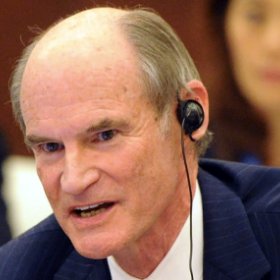
The Coming Transition in Global Governance
EWI Senior Vice President Bruce McConnell discusses the many challenges facing long-established national and international rules of law.
In a New York Times op-ed entitled “The Revolt of the Weak” (September 1, 2014), David Brooks ably catalogues the challenges of governing in today’s world, and, in particular, how hard it is for those in power to step back from the immediate and address what he calls “a crisis of context.” By this phrase he points to “certain weak movements and nations, beset by internal contradictions, that can’t compete if they play by the normal rules of civilization. Therefore, they are conspiring to blow up the rule book.” He illustrates with examples of Putin and the Islamic State, stating that they “are not threats to American national security, narrowly defined. They are threats to our civilizational order.”
It is not news that the “weak” feel disenfranchised from the current order. For many, including eight of the world’s ten most-populous nations, the post-World War II institutions were formed without their real participation. These institutions, formed by the victorious Allied powers, have served humanity remarkably well for over 60 years. But their time is coming to an end, and the breakdown in respect for the rule of international law by a “coalition of the unsuccessful” is a symptom of an accelerating global shift in concepts of power and order.
In the United States, our national government suffers from its own crisis of legitimacy, led by a Congress that is unable to accomplish the basic tasks of governance, and fed by increasing partisanship. As the leader of the free world and founding partner of the existing world order, America retains a diminishing claim to moral and political leadership on the global stage, even while it remains the most sought after destination for immigrants from the “weaker” world.
The context crisis is accelerated by technology, with its explosion of transparency, its stimulation of expectations of participation, its “flattening” power, and its ability to support collaboration across boundaries of all kinds. The democratization of information access is a direct threat to authoritarian regimes, which work hard to control its impact. But it is an indirect threat to industrial-age structures of any scale, whether private or public.
In China last month, a capital manager observed that the advent of smart phones has created 600 million citizen journalists, undercutting the role of the party cadres as information sources and aiding President Xi’s ambitious anti-corruption campaign. A senior government researcher opined that “the erosion of boundaries means the only remaining potential enemy of the State is the people.”
It is not only on traditional security issues that national and international institutions are proving incapable of acting quickly and effectively. As Susan Rice commented last year in an address entitled “America’s Future in Asia,” “many of Asia’s most vexing security challenges are transnational security threats that transcend borders like climate change, piracy, infectious disease, transnational crime, cyber theft, and the modern-day slavery of human trafficking.” For each of these a patchwork of formal and ad hoc arrangements is struggling to address the risks.
We are now at the stage where the outlines of the problem are becoming clearer, and we need to be alert not to fall for too long into merely admiring the problem for its difficulty and complexity. Rather, we need to explore alternative institutions that can take the place of those that are proving incapable of coming up with real solutions.
There is a definite role here for experimentation and a great need for new models to build on. For example, in April 2014 the government of Brazil hosted an international town-hall meeting—“NetMundial”—on the future governance of cyberspace. The 1,480 participants from 97 nations, convened under the banner of “multi-stakeholderism,” ranged from ambassadors to academicians, from Microsoft engineers to a Chilean non-profit promoting the right of digital access. As I wrote then:
Multi-stakeholderism, like many young life forms, is an awkward and somewhat tentative thing. Seven languages spoken with consecutive translation, four sectors represented plus the remote hubs, representatives standing in line to make two-minute interventions, and the open observation of the small drafting groups produced a slow and only “rough” consensus. And, with no governmental representatives on the drafting groups, one had the unique experience of seeing Canadian, German and U.S. cyber ambassadors leaning in, straining to hear the deliberations.
Clearly such a mechanism is not ready to be applied to dangerous security problems. But then, neither was the League of Nations. And, while a multi-stakeholder approach is promising, robust 21st century institutions will meet what are now universal expectations of transparency, accountability, inclusiveness, participation, predictability, agility, and effectiveness. The EastWest Institute is attempting to model these characteristics in its initiative to mitigate the negative effects of the increasing balkanization of the Internet.
We have a long road ahead, and we must cover it quickly. With, diligence, goodwill and tremendous luck, we can avoid two world wars to cement this transition.

